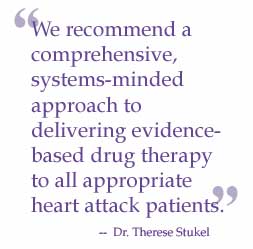|
|
For Release: March 16, 2005
Contact: DMS Communications (603) 650-1492
Drug Therapy as Good as Costly Invasive Cardiac Procedures for Elderly Heart Attack Patients
HANOVER, NH - Drug therapy offers elderly heart attack patients as good a chance of long-term survival as receiving expensive, invasive, high-tech cardiac procedures, such as angiography, angioplasty and bypass surgery, according to a new study.

Dr. Therese Stukel
To investigate the impact of different types of cardiac management, researchers at Dartmouth Medical School's Center for the Evaluative Clinical Sciences followed more than 158,000 elderly U.S. Medicare patients who were hospitalized with a heart attack in 1994 or 1995. U.S. regions were characterized according to the percentage of heart attack patients in the region who received invasive cardiac management and the percentage who received medical (drug) therapy. Patients were followed for up to seven years to see how the different cardiac management styles affected long-term mortality.
The study, published in the March 16 Journal of the American Medical Association (JAMA), showed that higher rates of drug therapy were associated with improved survival, regardless of invasive cardiac treatment. However, there was little or no improved survival benefit with invasive cardiac treatment in regions providing high rates of drug therapy.
"Our study has shown that routine provision of costly and invasive cardiac procedures doesn't improve survival for elderly heart attack patients, provided they are appropriately prescribed cardiac medications. Provision of these invasive services appears to be related to the availability of cardiac technology rather than patient severity," said lead author Dr. Therese Stukel, an adjunct professor of community and family medicine at Dartmouth Medical School (DMS).
"As well, our study has further confirmed that younger, healthier patients are more likely to receive invasive cardiac treatment, despite evidence demonstrating that older, higher-risk patients benefit more from such treatment.

"Going forward, we recommend a comprehensive, systems-minded approach to delivering evidence-based drug therapy to all appropriate heart attack patients. In addition, efforts should focus on providing invasive cardiac procedures only to those patients most likely to benefit," said Stukel, vice-president of research at the Institute for Clinical Evaluative Sciences (ICES) in Toronto, that investigates population-based health information.
Dr. David Wennberg, an adjunct associate professor of community and family medicine at DMS based at Maine Medical Center, and colleague Dr. Lee Lucas are co-authors of the study, "Long-term outcomes of regional variations in intensity of invasive vs. medical management of Medicare patients with acute myocardial infarction," funded by the Robert Wood Johnson Foundation.
-DMS-